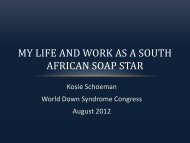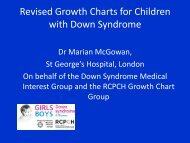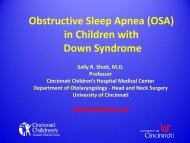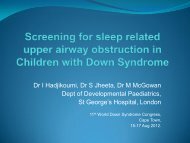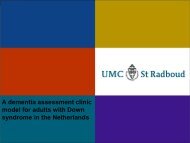Keeping Children and Adolescents with Down Syndrome Healthy:
Keeping Children and Adolescents with Down Syndrome Healthy:
Keeping Children and Adolescents with Down Syndrome Healthy:
Create successful ePaper yourself
Turn your PDF publications into a flip-book with our unique Google optimized e-Paper software.
<strong>Keeping</strong> <strong>Children</strong> <strong>and</strong><br />
<strong>Adolescents</strong> <strong>with</strong> <strong>Down</strong><br />
<strong>Syndrome</strong> <strong>Healthy</strong>:<br />
All the Medical Updates that<br />
Parents Need to Know<br />
Brian G. Skotko, MD, MPP<br />
Medical Geneticist<br />
Co-Director<br />
B<strong>and</strong> of Angels Foundation<br />
<strong>Down</strong> <strong>Syndrome</strong> Program<br />
Massachusetts General Hospital
Disclosures<br />
• My wife <strong>and</strong> I have no financial relationships <strong>with</strong> a<br />
commercial entity producing health-care related<br />
products <strong>and</strong>/or services.<br />
• Volunteer in a non-paid capacity to<br />
National <strong>Down</strong> <strong>Syndrome</strong> Congress<br />
Massachusetts <strong>Down</strong> <strong>Syndrome</strong> Congress<br />
B<strong>and</strong> of Angels Foundation<br />
• I have a sister <strong>with</strong> <strong>Down</strong> syndrome.
Goals<br />
• How do can you ensure that your son or daughter is<br />
getting the best medical care as it related to <strong>Down</strong><br />
syndrome?<br />
• What are some common medical conditions that occur in<br />
people <strong>with</strong> <strong>Down</strong> syndrome during childhood <strong>and</strong><br />
adolescence?<br />
• What healthcare resources are available to you, as<br />
parents?
My child has some<br />
difficult to manage<br />
behaviors!
<strong>Down</strong> <strong>Syndrome</strong> Behavior Checklist<br />
1. Exclude medical conditions.<br />
• Hearing difficulties<br />
• Vision difficulties<br />
• Thyroid problems<br />
• Celiac disease<br />
• Constipation<br />
• Obstructive sleep apnea<br />
2. Maximize expressive language skills.<br />
3. Think about behavior conditions.
Hearing Difficulties<br />
FACTS:<br />
DOCTOR:<br />
TESTS:<br />
75% of children <strong>with</strong> DS have hearing loss<br />
audiologist, otolaryngologist (ORL, ENT)<br />
audiology: birth, 6mo, 12mo, then yearly<br />
1. Conductive hearing loss: consider ear wax removal,<br />
tympanostomy tubes for fluid build-up, preferential school<br />
seating<br />
2. Sensorineural hearing loss: consider hearing aids, FM<br />
amplification system, preferential school seating<br />
3. Mixed hearing loss: both of the above
Vision Difficulties<br />
FACTS:<br />
DOCTOR:<br />
TESTS:<br />
~60% of children <strong>with</strong> DS have eye conditions<br />
ophthalmologist<br />
birth,
Thyroid Problems<br />
FACTS:<br />
DOCTOR:<br />
TESTS:<br />
~15% of children <strong>with</strong> DS have thyroid problems<br />
endocrinologist<br />
birth, 6mo, 12mo, then annually<br />
Symptoms: tired, sluggish, constipation, unusually cold,<br />
hyperactive, sweating, restless, diarrhea, behavior problems
Thyroid Problems<br />
FACTS:<br />
DOCTOR:<br />
TESTS:<br />
~15% of children <strong>with</strong> DS have thyroid problems<br />
endocrinologist<br />
birth, 6mo, 12mo, then annually<br />
1. Hypothyroidism: levothyroxine<br />
2. Hyperthyroidism: treat <strong>with</strong> medicines<br />
3. Compensated hypothyroidism (hyperthyrotropinemia):<br />
needs to be followed more closely; consider treating <strong>with</strong><br />
levothyroxine if persistently elevated
2011 Healthcare Guidelines for Physicians
1. Go to NDSS’s web page: www.ndss.org<br />
2. Click on “healthcare” on the left.<br />
3. Then click on “health care guidelines.”
http://cmeonline.med.harvard.edu/course_descriptions.asp?Course_id=121
Celiac Disease<br />
FACTS:<br />
DOCTOR:<br />
TESTS:<br />
~5% of children <strong>with</strong> DS have Celiac disease<br />
gastroenterologist (GI)<br />
beginning at 1 yo if symptomatic<br />
Symptoms: diarrhea, constipation, bloating, behavioral<br />
problems, vomiting, abdominal pain<br />
Diagnosis: start blood screen (IgA & TTG); intestinal biopsy<br />
Treatment: 100% gluten-free diet
www.childrenshospital.org/downsyndrome
Constipation
Constipation<br />
Bulk-producing agents: dietary fiber; benefiber supplements<br />
Softens stool: colace (docusate)<br />
Lubricant: mineral oil<br />
Motility/stimulant agent: senna, dulcolax, ex-lax<br />
Waters-down stool: Miralax (polyethylene glycol), milk of<br />
magnesia, lactulose
Obstructive Sleep Apnea (OSA)<br />
FACTS: up to 75% of children <strong>with</strong> DS have OSA<br />
DOCTOR: otolaryngologist; sleep medicine doctor<br />
TESTS: every child by the age of 4<br />
Does your child snore at night?<br />
Does your child gasp, choke, snort during sleep?<br />
Does your child fall asleep on short drives? At school?<br />
Does you child need to nap in an age-inappropriate way?<br />
Does your child not seem refreshed during the day?<br />
Sleep study (polysomnogram): only definitive diagnosis<br />
Treatment: medicine; tonsil/adenoid surgery; surgery
<strong>Down</strong> <strong>Syndrome</strong> Behavior Checklist<br />
1. Exclude medical conditions.<br />
• Hearing difficulties<br />
• Vision difficulties<br />
• Thyroid problems<br />
• Celiac disease<br />
• Constipation<br />
• Obstructive sleep apnea<br />
2. Maximize expressive language skills.<br />
3. Think about behavior conditions.
Augmentative <strong>and</strong> Alternative<br />
Communication<br />
http://www.childrenshospital.org/dream/videos.html?bcpid=5558497001&bclid=5525144001&bctid=16391898001
iPad
www.proloquo2go.com
www.woodbinehouse.com
<strong>Down</strong> <strong>Syndrome</strong> Behavior Checklist<br />
1. Exclude medical conditions.<br />
• Hearing difficulties<br />
• Vision difficulties<br />
• Thyroid problems<br />
• Celiac disease<br />
• Constipation<br />
• Obstructive sleep apnea<br />
2. Maximize expressive language skills.<br />
3. Think about behavior conditions.
Specific Behavioral Conditions<br />
ADHD (Attention Deficit-Hyperactivity Disorder): difficulty<br />
concentrating, paying attention, staying still in ≥ 2 settings<br />
OCD (Obsessive Compulsive Disorder): perseverations, repeated<br />
activities to the point of interference <strong>with</strong> daily activities<br />
Depression: loss of interest, sleep changes, appetite changes,<br />
concentration problems, <strong>with</strong>drawn<br />
Anxiety: excessive nervousness, fearfulness to the point of<br />
interference <strong>with</strong> daily activities
www.woodbinehouse.com
Autism Spectrum Disorder (ASD)<br />
Pervasive Developmental Disability (PDD)<br />
FACTS:<br />
DOCTOR:<br />
TESTS:<br />
up to 18% <strong>with</strong> ASD; about 6% <strong>with</strong> autism<br />
pediatric psychologist, pediatric psychiatrist<br />
neuropsychological evaluation;<br />
behavioral evaluation<br />
1. Significant communication difficulties<br />
2. Significant difficulties <strong>with</strong> social skills<br />
3. Repetitive behaviors<br />
TREATMENT:<br />
no less than 25 hours of ABA per week
I’m concerned about<br />
my child’s weight!
<strong>Down</strong> <strong>Syndrome</strong><br />
Growth Curves<br />
Weight<br />
Height<br />
Head circumference<br />
“The previously used <strong>Down</strong><br />
syndrome-specific growth charts<br />
no longer reflect the current<br />
population styles <strong>and</strong> body<br />
proportion.” AAP, 2011<br />
Weight/Height<br />
BMI
Overweight <strong>and</strong> Obesity<br />
OVERWEIGHT: >85% on BMI or weight/height<br />
OBESE : >95% on BMI or weight/height<br />
TESTS:<br />
NUTRITIONIST:<br />
HgA1c for diabetes<br />
total cholesterol<br />
Liver function tests<br />
once a month
www.downsyndromenutrition.com
My son’s/daughter’s<br />
skin is dry or has<br />
rashes!
Common Skin Findings<br />
Xerosis<br />
Eczema<br />
Cheilitis<br />
Onychomycosis<br />
Tinea pedis<br />
Alopecia areata<br />
Vitiligo<br />
Seborrheic dermatitis<br />
Cutis marmorata<br />
www.drugstore.com
My child wants to<br />
participate in<br />
contact sports.<br />
Okay?
FACTS:<br />
DOCTOR:<br />
TESTS:<br />
Atlantoaxial Instability (AAI) &<br />
Occipitoaxial instability (OAI)<br />
~15%, consequences rare but dangerous<br />
neurosurgeon, orthopedic surgeon<br />
C-spine (3 views: lateral, flexion, extension)<br />
• C-spines do not predict well which children are at risk<br />
• Normal C-spines do not provide reassurance that a child<br />
will not develop spine problems later<br />
• Routine C-spines not recommended in asymptomatic<br />
children<br />
• However, Special Olympics might require them for<br />
participation
Atlantoaxial Instability (AAI) &<br />
Occipitoaxial instability (OAI)<br />
SYMPTOMS<br />
Change in gait<br />
Change in use of arms or h<strong>and</strong>s<br />
Change in bowel or bladder function<br />
Neck pain<br />
Stiff neck<br />
Head tilt<br />
Torticollis<br />
New-onset weakness<br />
Hyperreflexia
Atlantoaxial Instability (AAI) &<br />
Occipitoaxial instability (OAI)<br />
≥ 4.5mm
Atlantoaxial Instability (AAI) &<br />
Occipitoaxial instability (OAI)<br />
ACTIVITY RESTRICTIONS<br />
Contact sports (e.g., football, soccer, wrestling)<br />
Gymnastics<br />
Horse-back riding<br />
Diving<br />
Trampoline usage<br />
Careful precautions during anesthesia
My child is limping<br />
<strong>and</strong> complaining of<br />
leg pain!
Hip Dysplasia/Dislocation<br />
FACTS:<br />
DOCTOR:<br />
TESTS:<br />
~1-4%: ages 2-10 years<br />
orthopedist<br />
Hip <strong>and</strong> knee X-rays, as warranted<br />
Whenever a joint seems to hurt, always consider getting<br />
additional X-rays of the joints above <strong>and</strong> below.<br />
TREATMENT:<br />
surgery, immobilization
Leukemia<br />
FACTS:<br />
DOCTOR:<br />
TESTS:<br />
My child is has some<br />
abnormalities in their<br />
blood cell types.
RBC platelet WBC<br />
↑ polycythemia<br />
↑ macrocytosis<br />
↓ anemia<br />
↑ thrombocytosis<br />
↓ thrombocytopenia<br />
↑ leukemoid<br />
reaction<br />
↓ leukopenia
Transient Myeloproliferative Disorder (TMD)<br />
• occurs10-20% of babies <strong>with</strong> <strong>Down</strong> syndrome<br />
• present at birth or <strong>with</strong>in first week of life<br />
• typically resolves in the first 3 months of life<br />
• 20-30% will progress onto leukemia by age 4<br />
If in this category: CBC ~3 months until age 4-6
Iron-deficiency anemia<br />
FACTS:<br />
DOCTOR:<br />
TESTS:<br />
many <strong>with</strong> DS have low dietary intake of iron<br />
pediatrician<br />
Hemoglobin, annually at 1 yo<br />
If hemoglobin < 11g, order<br />
(a) CRP <strong>and</strong> ferritin or<br />
(b) reticulocyte hemoglobin (CHr)<br />
TREATMENT:<br />
• improved dietary intake<br />
• iron supplementation
Should my child be<br />
taking supplements?
• Has a double-blind placebo-controlled research been done?<br />
• What are the potential side effects?<br />
• What are the potential long-term consequences?<br />
• What is the expense in time <strong>and</strong> money?<br />
• Are there any position statements by physicians or national<br />
<strong>Down</strong> syndrome organizations?<br />
1. Go to NDSS’s web page: www.ndss.org<br />
2. Click on “healthcare” on the left.<br />
3. Then click on “alternative therapies.”
Contact Information<br />
Web page: www.brianskotko.com<br />
Facebook: facebook.com/brian.skotko<br />
Twitter:<br />
twitter.com/brianskotko<br />
YouTube:<br />
http://www.youtube.com/brianskotko<br />
Hospital: www.massgeneral.org/downsyndrome<br />
B<strong>and</strong> of Angels Foundation



